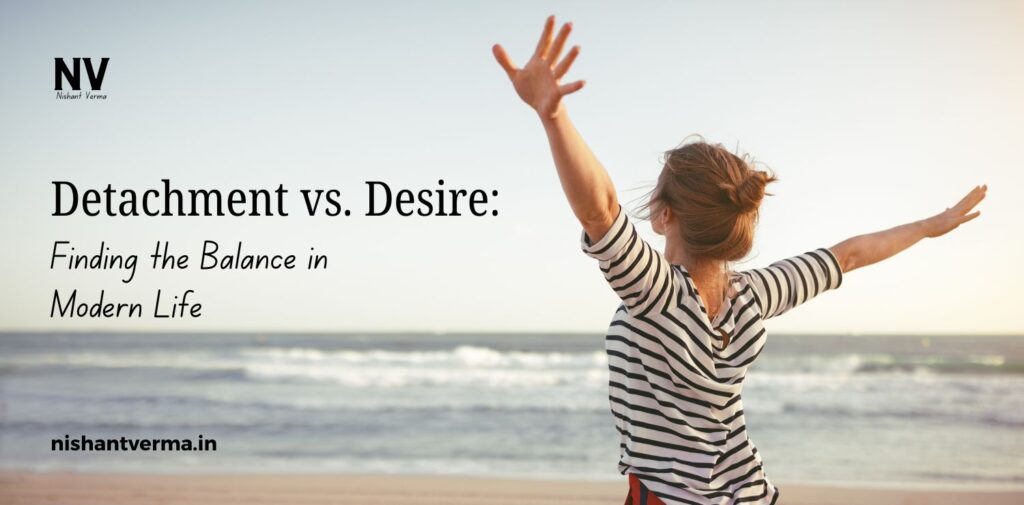In our fast-paced world, finding inner peace has become more difficult than ever. Everyone is chasing success, money, fame, relationships, and material comforts. While having dreams and goals is essential, being too attached to them often leads to stress, disappointment, and anxiety. On the other hand, some people believe that the only way to be happy is to give up all desires and live a life of complete detachment. But is that really practical or even necessary?
In Indian philosophy, both detachment vs. desire are important concepts. They are not enemies, but two sides of the same coin. The real challenge is not choosing one over the other, but learning how to balance them. This article will explore how we can find that balance in a simple, meaningful, and practical way, especially in the context of Indian values and day-to-day life.

Understanding Desire: The Fuel of Life
Desire is a natural part of human life. From a young age, we have desires – the desire to play, to eat our favorite food, to achieve something, to be loved, and to love others. As we grow up, our desires also grow. We want a good job, a stable income, a comfortable home, a loving family, and respect in society. These are not bad things. In fact, desires often push us to work harder, grow, learn new things, and improve our lives.
In the Indian tradition, desire is called “Kama.” It is one of the four Purusharthas or goals of human life, along with Dharma (duty), Artha (wealth), and Moksha (liberation). So clearly, desire has its place. The problem arises when desire turns into greed or obsession. When we get attached to the outcome of our desires and cannot accept failure or loss, we suffer. When we compare ourselves with others and keep wanting more, we feel unhappy even after achieving a lot.
Understanding Detachment: Freedom from Within
Detachment, or “Vairagya,” does not mean giving up everything and going to the forest. It simply means learning not to be controlled by our desires and emotions. It is about staying calm whether we win or lose, succeed or fail, get what we want or don’t. detachment vs. desire helps us live in the present moment, accept reality as it is, and find peace within ourselves.
Many people misunderstand detachment as coldness or lack of emotion. But true detachment means being fully involved in life without being overly attached to any result. Lord Krishna explains this beautifully in the Bhagavad Gita: “You have the right to perform your actions, but not to the fruits of your actions.” This teaches us to focus on doing our duty sincerely, without worrying too much about success or failure.

The Middle Path: Desire with Awareness, Detachment vs. Desire with Compassion
So, how do we find the right balance between detachment vs.desire ? The answer lies in awareness. When we become more aware of our thoughts, feelings, and actions, we can recognize when our desires are becoming harmful. We can also understand when our detachment is turning into indifference or lack of motivation.
For example, if you are working hard for a promotion, that is a healthy desire. But if not getting it leaves you feeling depressed or angry, that shows excessive attachment. Similarly, if you lose interest in everything and stop trying to improve your life in the name of detachment, that is also an extreme.
The key is to act with full dedication, but stay mentally prepared for any outcome. Celebrate your success, but don’t let it go to your head. Learn from your failures, but don’t let them break your spirit. Be passionate, but not obsessed. Be detached, but not careless.
Practical Ways to Cultivate Balance in Daily Life
- Practice Mindfulness: Mindfulness means being fully present in the current moment. When you eat, eat mindfully. When you work, give it your best. When you rest, rest fully. This habit helps you enjoy life without being too attached to any particular desire.
- Reflect Regularly: Spend a few minutes every day thinking about your goals and actions. Ask yourself: Why do I want this? Is it coming from ego, insecurity, or a genuine wish to grow? Reflection helps you keep your desires in check and develop inner wisdom.
- Accept Uncertainty: Life is uncertain, and not everything is under our control. Accepting this truth makes it easier to let go of rigid expectations and stay calm in difficult times.
- Focus on Values: Instead of blindly chasing success, focus on living according to your values – honesty, kindness, hard work, compassion, and gratitude. When you live by values, you naturally find joy and peace even if things don’t always go your way.
- Learn from Spiritual Teachings: Indian spiritual texts like the Bhagavad Gita, Upanishads, and teachings of saints like Ramana Maharshi, Swami Vivekananda, and Kabir offer deep insights into how to live a balanced life. Their words can guide you when you feel lost or confused.
- Stay Humble: No matter how successful you become, remember that everything in life is temporary. Staying humble helps you remain grounded and detached from ego-driven desires.

Real-Life Examples That Inspire
There are many people who have shown us how to balance detachment vs. desire in real life. Take the example of Dr. A.P.J. Abdul Kalam. He had strong dreams and worked tirelessly to serve the nation. Yet, he remained humble, spiritual, and detached from fame or personal gain. Another example is Mahatma Gandhi. He desired freedom for India, but he was detached from hatred or violence. His strength came from his inner peace, not outer power.
Even in ordinary life, we find people who strike this balance. A teacher who works sincerely without expecting rewards, a businessman who runs his business ethically, or a homemaker who cares for her family without expecting anything in return – all these are examples of living with detachment vs. desire together.
Conclusion: Detachment vs. Desire
Detachment vs. Desire are not enemies. They are tools that, when used wisely, can help us live a meaningful and fulfilling life. Desire gives us direction and motivation. Detachment gives us peace and strength. Together, they help us grow without losing ourselves.
Especially in today’s India, where traditional values meet modern aspirations, this balance is more important than ever. You can dream big and work hard for success, while also learning to stay calm, content, and kind – no matter what the outcome.
So, let your Detachment vs. Desire rise like the morning sun, but let your mind remain as calm as the still moon. In that balance lies true happiness.




